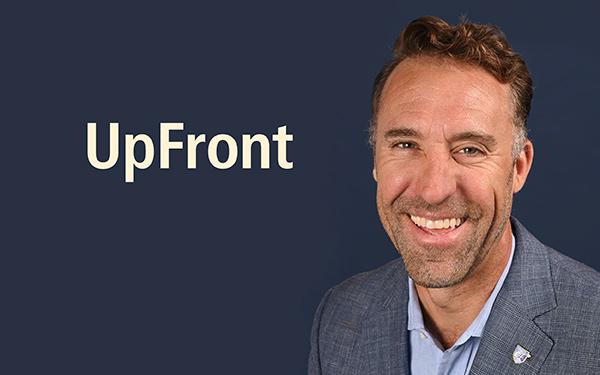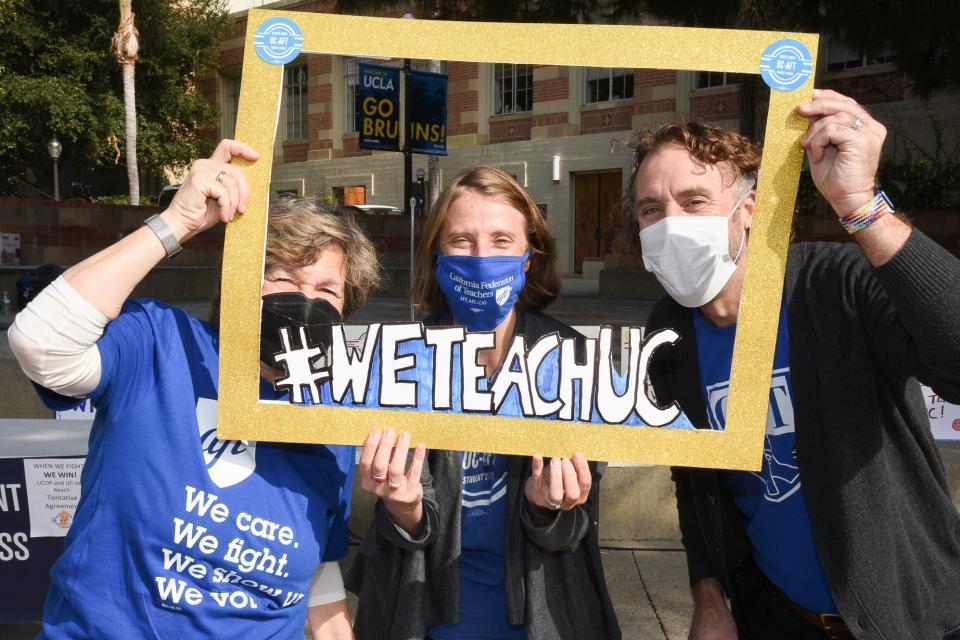By Jeffery M. Freitas, CFT President
For about three years the University Council-AFT engaged in protracted negotiations on behalf of lecturers in their unit. Their aims have always been about fairness — better working conditions for lecturers and improved learning conditions for students.
Their fight has been about not only winning economic and contractual gains for members, but gaining professional respect and recognition for their teaching at the University of California. Their campaign has been a true member-driven effort, rooted in years of organizing by the statewide local that represents both continuing lecturers and librarians, led by their president, Mia McIver, and a committed negotiations team.
On November 17, at 3:45 am — the day of UC-AFT’s planned statewide “Unfair Labor Practice” strike — I woke up to a text message saying that after a long night of bargaining, UC-AFT had secured a tentative agreement giving them the contract gains they sought. Though I had intended to rise early and join the ULP strike, it was a thrill to join members, not on the picket line, but at a celebratory rally for their contract victory.
Among other gains, lecturers won salary increases that average 30% over the life of the contract, increased job security protections and opportunities for advancement in the first five years of employment, ratification bonuses for unit members, and language that addresses workload issues. It is a historic agreement; it is a long overdue victory; and it was made possible by the organizing done and unity displayed by members of UC-AFT, Local 1474.
Just 11 days later, I was sent a link to an article in the Los Angeles Times with a photo of Randi Weingarten and me celebrating this amazing win. To my surprise it was an editorial by the Times Editorial Board with the title, “Colleges’ overreliance on adjunct faculty is bad for students, instructors and academic freedom.” The editorial board makes the case that “Adjunct faculty, generally underpaid and without job security, make up 75% of all college instructors. Higher education now depends on them, which could be a saving grace.”
After years of arguing this very point before the Legislature, with the UC and California Community College systems, seeing this sentiment in a high-profile California newspaper was vindicating. People are finally starting to hear what we have been saying for decades: The overreliance of adjunct/part-time/contingent faculty in our higher education system has deprofessionalized the work and been a detriment to student success. It is gratifying to see this conversation take center stage, and it is in no small part due to the UC-AFT contract victory, which has shone a bright light into the dark recesses of higher education staffing.
But the CFT has not waited until now to take action on these issues. We have diligently been working on and developing a plan.
In the fall of 2020, data from the Community College Chancellor’s Office reported that two out of three community college faculty members — more than 37,000 — were working part-time, on a contingent basis. That means the majority of faculty have no job security, teach for substantially lower pay than their full-time colleagues, and receive few to no benefits. In some districts, more than three-quarters of faculty are employed part-time.
We are also aware that many part-time faculty work for multiple districts due to the piecemeal employment required to cobble together a living, and this limits the benefits provided to faculty under each of the labor agreements. Additionally, part-time faculty literally spend hours on the freeways driving from campus to campus instead of being available to offer students the academic support and guidance they deserve during office hours.
That’s why CFT is building on our previous campaign successes to focus on community college part-time issues. We have hired a part-time faculty campaign coordinator to lead our efforts. The campaign will build union power with the goal of improving conditions for part-time community college faculty throughout the state. As its priorities, the campaign will mobilize faculty members, integrate local collective bargaining issues, develop an ongoing annual Part-Time Faculty Conference, and coordinate research and organizing efforts across 27 local unions with our legislative agenda in Sacramento.
We will conduct a detailed survey of CFT’s 17,000 part-time community college faculty members and form teams of member activists at each local. Through these efforts and others, the campaign will expand access to affordable, quality healthcare by increasing funding and exploring new models for insurance coverage. Depending on survey results and other factors, we look to take on systemic issues such as wage parity, raising the cap on teaching load, increasing full-time positions, and capping class size.
Faculty commitment to providing quality education at the community colleges has never wavered. With the opportunities provided by a state budget surplus and acknowledgement from one of the state’s largest media outlets that overreliance on part-time faculty is bad for students, the timing to build the campaign that will bring equity and professionalism back to our higher education system has never been better.
Thank you UC-AFT for leading the way.



